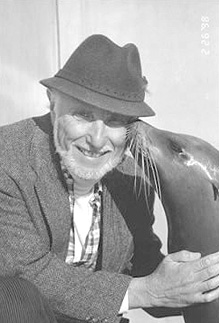|
May 26, 2003
Marine mammal researcher honored with symposium
at Long Marine Lab
By Shawna Williams
Ronald Schusterman, adjunct professor of ocean sciences, saw his professional
life pass before his eyes at a symposium held in his honor in April
at UCSC's Long Marine Laboratory. Scientists he has trained and worked
with over a 40-year career presented their current research at the symposium,
organized by Colleen Reichmuth Kastak, a postdoctoral researcher in
Schusterman's lab.
|

|
|
Ron Schusterman gets a kiss from Rocky the sea lion.
Photo courtesy of Colleen Kastak
|
One of the world's leading experts on pinnipeds (seals and sea lions),
Schusterman is retiring this year. He has been based at UCSC's Long
Marine Lab since 1985.
The symposium, "Comparative Perspectives on Perception, Cognition,
and Behavior: A Festschrift in Honor of Ronald J. Schusterman,"
brought together 18 of Schusterman's former students, mentors, and collaborators.
"It was a really unusual symposium because it brought people together
from a lot of different fields. In addition to marine mammal research,
it included everything from primate work to shark studies to human behavior
research," said Kastak, who started working in Schusterman's lab
as an undergraduate and earned her Ph.D. with him.
Many of Schusterman's former students took part in the symposium,
such as Patrick Moore, who now studies echolocation in dolphins as head
of biosonar research for the U.S. Navy marine mammal program. Schusterman's
early mentor William A. Mason, now a professor emeritus of psychology
at UC Davis, discussed his research on social behavior in nonhuman primates.
Other speakers included Paul Nachtigall, director of the marine mammal
research program at the University of Hawaii and president of the Society
for Marine Mammalogy, and Burney Le Boeuf, professor emeritus of ecology
and evolutionary biology and associate vice chancellor for research
at UCSC.
Schusterman's research has focused on the sensory and cognitive abilities
of seals and sea lions. Over the years, he has worked with California
sea lions, harbor seals, and elephant seals at Long Marine Lab, conducting
careful experiments to understand how they perceive the world around
them and process information.
Schusterman has done extensive research on vision and hearing in pinnipeds.
He showed, for example, that elephant seals can see remarkably well
in the darkness of the ocean's depths. His hearing studies have helped
focus attention on the potential impacts of manmade noise in the ocean
environment.
"There's an awful lot of noise in the ocean, most of it human-generated,"
said Le Boeuf. "It's important to know whether we're affecting
life in the ocean, and Schusterman's research helps to answer this question."
Schusterman's lab has also made surprising discoveries about the cognitive
abilities of pinnipeds. For example, the researchers found that sea
lions have a problem-solving ability (known as "equivalence")
previously thought to require language. This ability enables the animals
to solve complex problems in their natural environment, which Schusterman's
lab was able to demonstrate by training sea lions to match pairs of
related pictures.
Ten years after training two California sea lions to match pictures,
Kastak and Schusterman retested one of them and found that she immediately
remembered how to do it, even though she had not practiced at all in
the intervening years. The researchers' findings, published last year,
were the first demonstration of long-term conceptual memory in a nonprimate
species.
Schusterman said he will continue to participate in and encourage the
research program on pinniped cognition and sensory systems at Long Marine
Lab after his retirement.
Return to Front Page
|